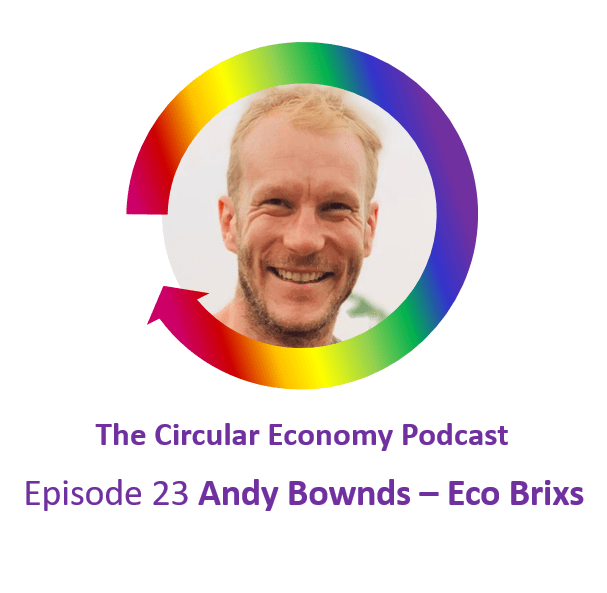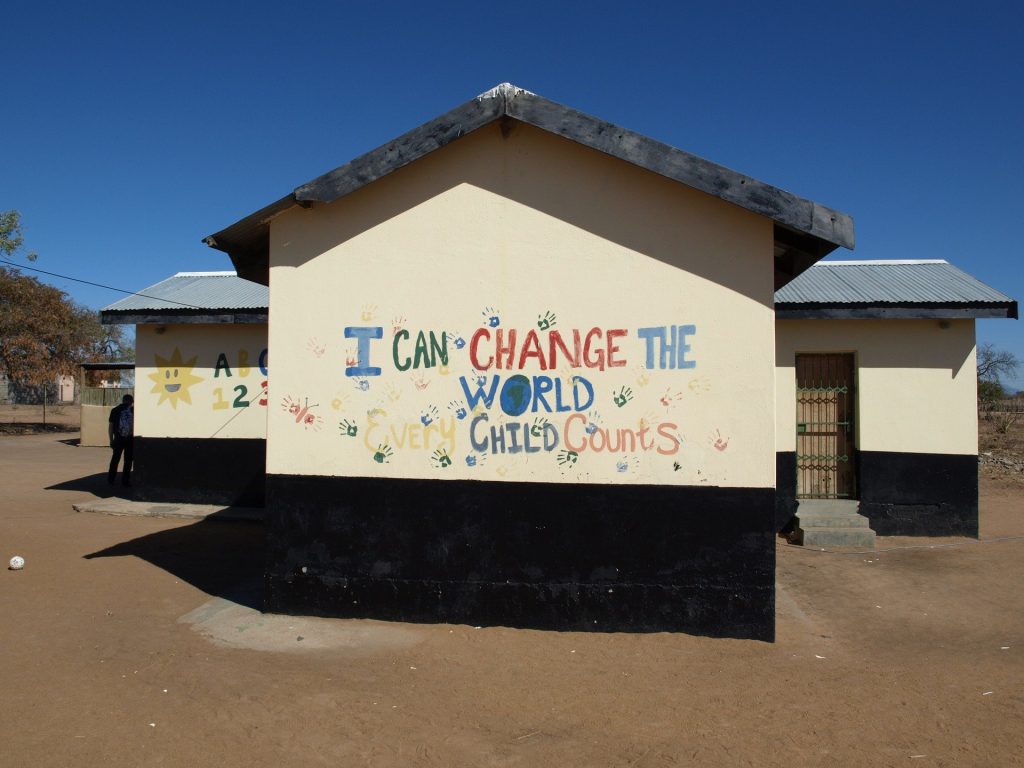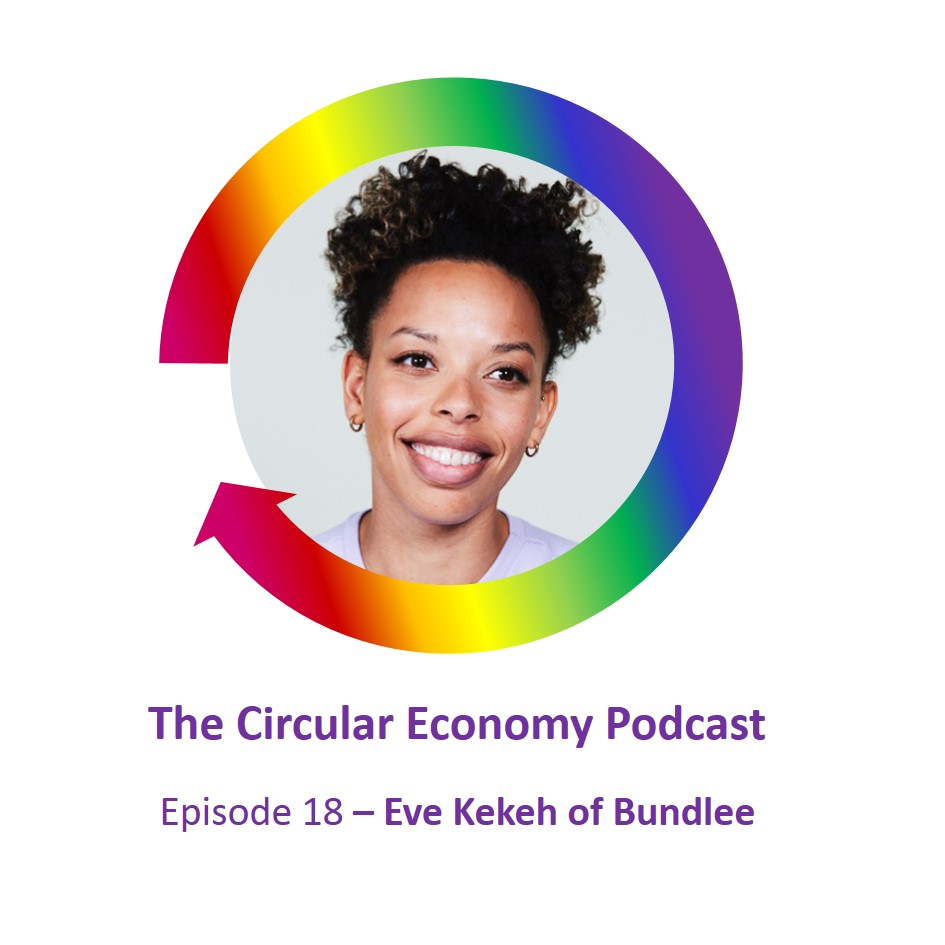Eco Brixs / Lessons from social entrepreneurs in Africa / 30 under 30 / Don’t try to fix the problem
"Some dream to escape reality ...others dream to change reality forever" Soichiro Honda
We help entrepreneurs, companies and business leaders discover and use the circular economy – to build profitable, resilient, sustainable and successful businesses. We believe in a circular economy that is fair, transparent and inclusive, to create a better world for everyone.
Welcome to the latest round-up of what we’ve shared, and what’s inspired us. We hope you and your families are staying safe and well, and you are managing to stay optimistic about the post-Cov-19 world. We’ve been thinking about what will change, and hoping we become more connected, compassionate, caring – and circular! In this issue:
- Episode 23 of the Circular Economy Podcast, with Andy Bounds of Eco Brixs, in Uganda
- Catherine’s latest blog: Transforming plastic waste into social value: lessons from circular entrepreneurs in Africa
- What we’ve been reading – don’t try to fix the problem!
- Thank you letters
- Optimism and Outrage – our latest!
Did you receive this email from someone else? You need your own! Stay in touch for free circular economy insights and updates, direct to your Inbox.
Don’t want to hear from us any more? Just unsubscribe!
Episode 23 of the Circular Economy Podcast, with Andy Bownds of Eco Brixs in Uganda
Eco Brixs Mission is “To create green, environmentally friendly, sustainable solutions to lift people out of abject poverty in Uganda”, and it does that by giving trash – waste plastic – a value. That means anyone in the community can recycle.
Eco Brixs started out in 2017. Frustrated with the lack of waste management systems in Masaka, Andy Bownds and his team started collecting plastic in his back garden. After collecting two tonnes pretty quickly, decided to start a simple plastic collection facility called ‘Masaka Recycling Initiative’.
They went further, creating a circular economy solution to recycle plastic that supports the local communities and economy. They developed an innovative plastic-sand composite paver, proven to be stronger, lighter and more durable than concrete. Fast-forward to 2019, and Masaka Recycling Initiative has now evolved into ‘Eco Brixs’, one of the largest recycling facilities outside of Kampala.
Find the podcast series on iTunes, Google Podcasts, PlayerFM, Spotify, TuneIn, or search for “circular economy” in your favourite podcast app.
To stream the episode from your web browser, and see the links and show notes, click here
PS We’d love it if you could post a review, and help other people find us!
Transforming plastic waste into social value: lessons from circular entrepreneurs in Africa
Across Africa, and much of the world, end-of-use plastic is not collected for proper recycling. Instead, it is burnt; ends up in drains, sewers, fields and rivers; or in unprotected landfill, allowing toxins and microplastics to leak out. This is one of the hidden costs of our modern ‘linear’ economy – take, make and waste.
Four entrepreneurs are turning that plastic waste into value – creating jobs for both disadvantaged and skilled people, improving local environments, and helping people find a purpose. We dig into their business models and hear their top tips for circular startups. Read more…
Congratulations to podcast guest Eve Kekeh
Wowser! Well done to Eve Kekeh, founder of babywear rental-subscription company Bundlee, recently named as one of Forbes magazine’s ‘30 under 30‘ social entrepreneurs in Europe. To hear our interview with Eve, have a listen to the Circular Economy Podcast episode 18. You can read also Catherine’s follow-up blog, The ‘new normal’ – why renting clothes is better for us, our planet, and our babies here
Don’t try to fix the problem
In the face of the Coronavirus pandemic, many of us are rethinking our business strategies. We can see many of the potential risks, including broken supply chains, falling demand, reduced spending power, and massive disruption to ‘business as usual’ for everyone.
In the Guardian last Saturday, Oliver Burkeman recommends the approach of creativity coach Robert Fritz. He thinks focusing on ‘solving the problem’ is the very reason we fail to solve the problem. Sounds paradoxical? Burkeman explains that if things are intolerable, and you take just enough action to render them tolerable, you’ll go back to tolerating them until they grow worse again. That means things aren’t really changed for the long term.
The are two goals pulling you in different directions. You want a happy relationship or a sustainable business, but you don’t want the discomfort of transforming your relationship or business. The end result is that you pursue the first goal until it starts to conflict with the second goal (avoiding an uncomfortable change).
How do you solve this? Fritz has written several books on this, and Burkeman boils it down for us (admitting he oversimplifies it). The key is not to focus on the problem (unless it’s an emergency). Instead, first, decide on your end goal, or vision. Secondly, be clear about your ‘reality’ – where you are now and the current situation in relation to your goal. Fritz says these two steps are linked by structural tension – an essential part of the process. Third, set out the steps and actions needed to invent the future you seek. As you accomplish your goals, let each one build momentum towards the next goals.
You can see Robert Fritz’s video on his latest book, ‘The Path of Least Resistance’ here
Fritz sets out three principles:
- Energy moves along the path of least resistance
- The underlying structure of anything will determine the path of least resistance
- We can change the underlying structures that we’re in.
The principles apply everywhere: business, family life, education, and any part of our lives. Fritz finishes with a quote from American historian Theodore White. When asked what he thought was the most powerful force in history, White replied “The idea.” Fritz is clear that each of us can become the predominant creative force in our own lives.
Thank you letters
Thanks to Dr Gunter Pauli for the Soichiro Honda quote in our headline… Catherine heard Dr Pauli talk about his work on the Blue Economy and ZERI at the Institute for Manufacturing symposium at Cambridge University a few years ago.
Thanks also to Eugen Nikolajev, who emailed to say he’d used our blog, Six Ways to Create a Plastics Circular Economy, to help with his drinking water cost and carbon comparison tool. The tool helps you work out the running costs of bottled versus filtered water (and you can easily adapt it for tap water). You can find the tool here, and it might spark some ideas to help customers calculate the benefits of your own products and services.
And thanks to Alex at Sustainability Illustrated for more excellent short videos – this time answering the top four ‘sustainability’ questions people are searching for on Google: Sustainability? Answering Google’s 4 Most Search Questions
Optimism and outrage
Inspired by the ‘Outrage and Optimism podcast‘ by Christiana Figueres (Executive Secretary of the UNFCCC 2010-2016), Tom Rivett-Carnac (ex UNFCCC and CDP) and their team at Global Optimism, we’re highlighting things we’re feeling outraged by! Quite a few people expressed outrage about the demand for public bail-out money coming from the super-rich owners. Andrew Charlton, writing for Forbes last week, asked several searching questions about the case being made by airline owners to treat their sector as a priority.
We’re feeling optimistic about the growing interest in repairing. Recently, Catherine was asked to review a forthcoming book, ‘Repair Revolution: How Fixers Are Transforming Our Throwaway Culture’ by John Wackman and Elizabeth Knight (due out in December). TV producer and writer John Wackman founded the first repair café in New York.
Find out more about Repair Cafes here – though I guess the face-to-face events will be few and far between for a few months 🙁 iFixit.com is a fantastic (free) resource for those wanting help with repairing tech, clothes, household objects and much more. In Europe, there is a ‘right to repair’ campaign Europe phones campaign
And thanks to our friend and textile sustainability expert Charles Ross for sharing this article on another linear economy strategy: planned obsolescence
Want some help in thinking through how to move away from planned obsolescence, towards durable, repairable and even sharable products? Let’s have a chat…
Hope you have a good week…
Did you receive this email from someone else? You need your own! Stay in touch for free circular economy insights and updates, direct to your Inbox.
Please feel free to forward the newsletter to any of your friends or colleagues who are interested in all things circular! Don’t want to hear from us? Just unsubscribe!


